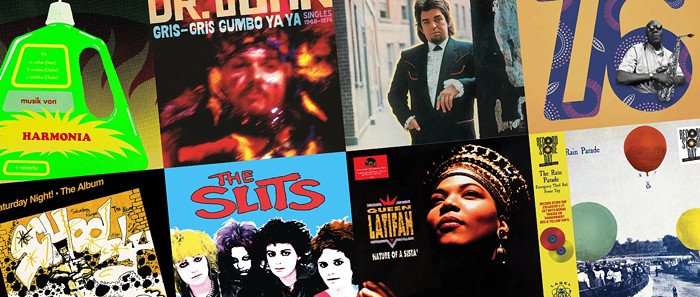The Welsh/German singer-musician Annika Henderson (aka Anika) has had an interesting career as a dub-informed anti-diva who can subtly radicalize dance floors or recontextualize the rock canon, depending on her whims. Nearly a decade ago, Portishead/Beak> producer Geoff Barrow discovered Anika's talent and helped to elevate her to public consciousness in what has turned out to be one of his best aesthetic decisions.
Anika—also a political journalist who focuses on science and education policy reform—has a distinctive knack for covers, draping her deadpan voice around both hits and deep cuts by cult artists to slanted and enchanted effect. With a timbre somewhere between Nico's Teutonic starkness and Slits frontwoman Ari Up's childlike playfulness, Anika has mastered the art of sounding at once in a trance and incisive.
To get an idea of how ingeniously she toys with other people's songs, check out Anika's reworkings of Bob Dylan's 1963 anti-military folk classic "Masters of War" and the Crystals' Phil Spector–produced 1962 song "He Hit Me (and It Felt Like a Kiss)." On the latter, Anika and her band—essentially British neo-kraut rockers Beak>—transform songwriters Gerry Goffin and Carole King's cringeworthy tale of domestic abuse toward a woman by her lover into an ethereal yet stoic death march in which Anika comes across as too much of a dominatrix to succumb to such abuse; the beats even sound like synthetic whip cracks. Coming from such a progressive, assertive woman, her version serves as a meta-commentary on shifting attitudes about women's agency within relationships.
With "Masters of War," Anika and company rearrange the molecular structure of Dylan's spindly original—a traditional song arranged by folk singer Jean Ritchie—via dub-wise effects, beefing up the bass and lending graceful gravity to Dylan's stridently condemnatory poetry. (Its message is still as tragically relevant as ever.) What's most striking is the ballistic viciousness of the reverbed beats that punctuate Anika's foreboding vocals, which aptly ratchet up the song's tension. It's one of the greatest cover versions of the 21st century.
Since I interviewed Anika for these pages in 2011, she's been busy, collaborating with British techno/electro vet Dave Clarke, German industrial-techno nutter T.Raumschmiere, post-dubstep maverick Shackleton, and neo-krautrock ensemble Camera. And in 2014, she started the band Exploded View with Mexican musicians Martin Thulin and Hugo Quezada.
Exploded View's eponymous 2016 debut album continues Anika's fascination with heavy dub bass and songs that sound like PiL's Metal Box fronted by Nico. It's an odd amalgam of dub and post-punk, with Anika's anomic voice paradoxically punching above its emotional weight. Last year's Obey full-length delves more into song-oriented electro-punk, modulating Anika's trademark spookiness into slightly more radio-friendly components. There are even some ballads ("Open Road," "Gone Tomorrow"). But don't worry: Anika never lets pop's high-fructose corn syrup seep into her compositions.
In our earlier interview, Anika asserted that artists "should challenge the status quo and what is considered normal and acceptable to the consumer. It is easy to go along a safe path and not challenge, but all the more gutsy to risk vilification and rub people the wrong way." She's kept her word.




















